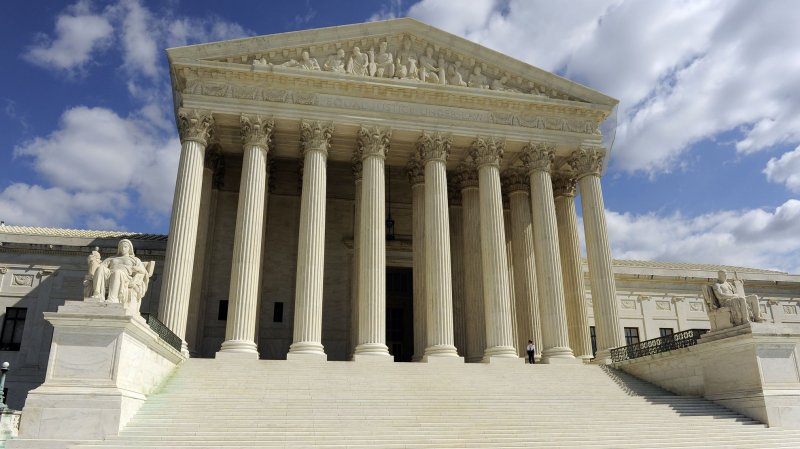The Supreme Court building in Washington on October 1, 2010. UPI/Roger L. Wollenberg |
License Photo
WASHINGTON, May 24 (UPI) -- The U.S. Supreme Court, in a split decision, Thursday ruled an Arkansas man can be retried for murder because a jury deadlocked on some charges.
In the 6-3 decision, Chief Justice John Roberts, writing the majority opinion, said a defendant is protected against retrials -- double jeopardy -- only when the first jury had made a final decision on the charges.
"The double jeopardy clause protects against being tried twice for the same offense. The clause does not, however, bar a second trial if the first ended in a mistrial. Before the jury concluded deliberations in this case, it reported that it was unanimous against guilt on charges of capital murder and first-degree murder, was deadlocked on manslaughter, and had not voted on negligent homicide. The court told the jury to continue to deliberate. The jury did so but still could not reach a verdict, and the court declared a mistrial. All agree that the defendant may be retried on charges of manslaughter and negligent homicide. The question is whether he may also be retried on charges of capital and first-degree murder," Roberts wrote.
Lawyers for defendant Alex Blueford said he could not be retried on charges of capital murder or first-degree murder because the jury in the case (Blueford vs. Arkansas) had voted to acquit him and then split on whether to convict on a lesser manslaughter charge.
With the jurors deadlocked, the Arkansas judge declared a mistrial.
Blueford was charged with capital murder, first-degree murder, manslaughter and negligent homicide in the death of his girlfirend's year-old baby. He said the toddler was killed in an accidental fall.
Justices Antonin Scalia, Anthony Kennedy, Clarence Thomas and Samuel Alito Jr. were joined by Justice Stephen Breyer in the majority opinion.
In her dissent, Justice Sandra Sotomayor wrote: "This case demonstrates that the threat to individual freedom from reprosecutions that favor states and unfairly rescue them from weak cases has not waned with time. Only the court's vigilance has."















